EUSA Insider:
Dorota Luczak-Dydowicz
Age: 58
Position: Volunteer
Published 28 October 2024
Dorota has participated in many EUSA sports events as a volunteer, together with her sister Beata, giving an example that there is no limit in doing things when you do them with a lot of passion. Dorota and her sister both participated in the European Universities Games in Debrecen - Miskolc this summer.
1. What motivated you to participate in the EUG 2024?
The inspiration to join the team of EUSA volunteers came from my twin sister Beata. I have the soul of a activism and I am eager to get involved in social initiatives to help people achieve their own successes using my competencies, having fun and satisfaction at the same time. This is more valuable reward for me than just money in the bank account. I've been involved in sport since I was a child, but I didn't think that volunteering in sport would be so exciting. So when Beata encouraged me several years ago to help organize sports events in Poznan, Poland where I used to live, I said “yes” immediately. It started with simple activities like securing a marathon route. However, even these activities gave me great pleasure and made me feel like belonging to a group of wonderful people - volunteers. I also enjoyed the feeling of contributing to athletes' success. Due to a change of job and a move to Ireland, the number of opportunities for volunteer work in the field of sport decreased significantly compared to my sister. However, I did help as a volunteer at the Polish Honorary Consulate in Limerick. When Beata and Francesco (her partner, whom she had actually met while volunteering) shared with me their impressions of the EUG 2022 in Lodz, Poland, where they spent time not only helping the teams but also enjoying their free time with volunteers from all over Europe and even other parts of the world, I exclaimed, "I want to be there too! From that moment on, I eagerly waited for the start of the recruitment process for 2023, and Beata was a great help to me. In July 2023 I was in Granada, Spain at the EUSA Tennis Championship. It was my first time as an international volounteer. With the members of the organizing committee, EUSA representatives, and local volunteers, I immediately felt like part of a family. Among the student-athletes, I felt like I was 20 again. And although I was active from sunrise to sunset (at my own request): I remained happy. So, I was looking forward to my first EUG 2024, where not one, but 17 sports, not 120, but 5,000 athletes would gather in one place (though actually in two, Miskolc and Debrecen, Hungary). And I was eagerly awaiting the results of the recruitment.
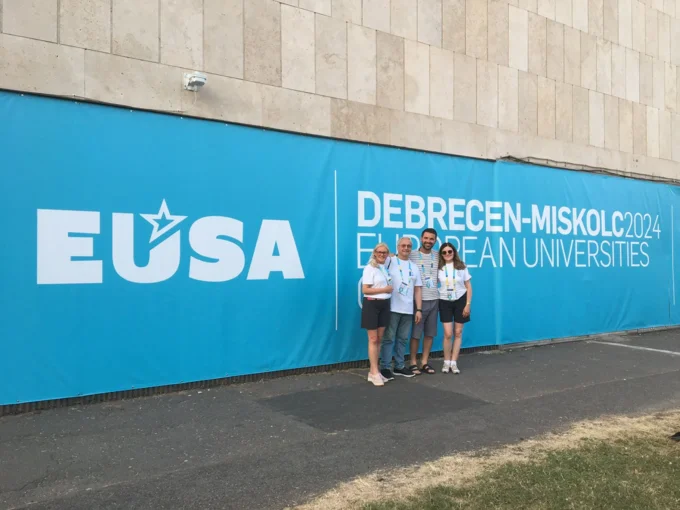
2. Is this your first time to participate in an EUSA event?
It all depends on the size of the event, so you could say yes and no. This is my second EUSA event I have volunteered at. The first was a year ago. It was the Tennis Championships in Ganada, Spain. It was a debut event for both me and the college organization committee. I have to give them top marks in all of the categories that are important to me. Friendly, family atmosphere, full commitment and willingness to help, attention to every detail to provide the athletes with the most comfortable conditions for success and to provide us volunteers with joy and satisfaction. Compared to this year's EUG 2024, it was an intimate event where we all had the opportunity to get to know each other, cheer each other on, have fun and spend time together. I worked with the organizing committee, EUSA representatives, local volunteers, and of course the athletes and their coaches to help them focus on their athletic goals. It felt like an "Olympic village" to me. With the emphasis on "village", where everyone knows, respects and cares for each other.
EUG 2024 is a much bigger event. It's not a village anymore, but an "Olympic agglomeration", which is why I can say that this is the first time that I have taken part in such a big event of the EUSA. Not only one, but several disciplines took place at the same time, the number of participants - universities, athletes, coaches, referees and volunteers - was many times higher. The area of activity and the amount of work to be done was also larger.
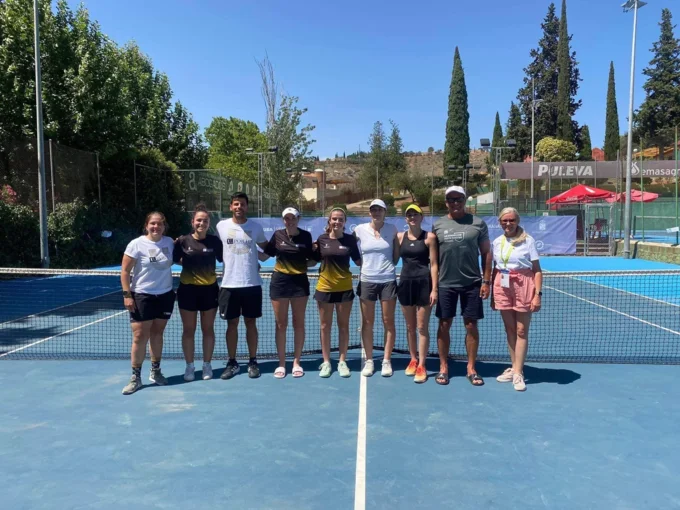
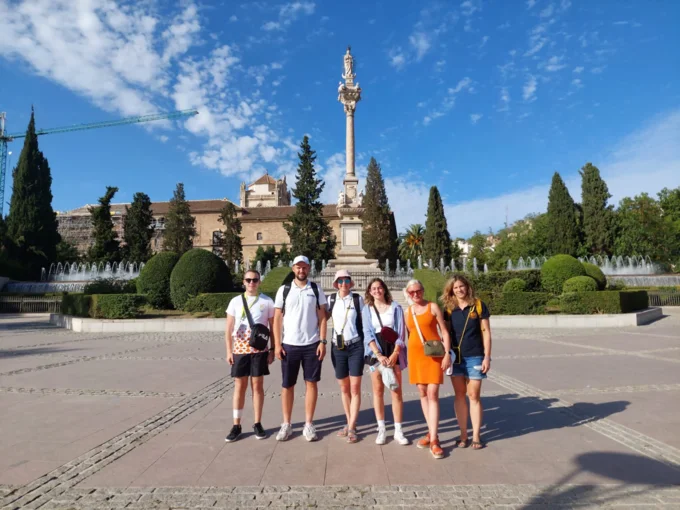
3. How would you describe your experience as volunteer at the European Universities Games 2024?
It is definitely harder to create a family atmosphere where everyone knows, respects and cares for each other in such a large community. In that kind of environment, the hierarchy is more complicated and the process of making decisions is longer. It is like a company with many departments and levels, where one feels more like a cogwheel or a piece on a chessboard, moved from one location to another. But the job is the same - to help the organisers create the world's best event, so that everyone feels comfortable, fulfilled and wants to come back for the next edition. To fulfil my dream and achieve the goal I came with, I had to overcome obstacles and myself, not give up and fight until the end. So, after a few days working at the Aurora Hotel information desk, away from the sporting events, the hustle and bustle, I could actively help with the beach volleyball. The activity, the sun, the sand, the music and, last but not least, the cheering was just what I needed to generate positive emotions and energy to share with others. I cannot say that my time at the information desk was wasted. Far from it. I had a chance to meet and talk to volunteers from Hungary and Italy, as well as EUSA representatives, members of EUSA family and referees. It's worth giving your time to meet such great, friendly and open-hearted people who respect everyone.
4. Why would you recommend people get involved in volunteering with EUSA?
Even though I am just at the beginning of my adventure of volunteering in an international group, it has been nice to meet wonderful volunteers from different parts of the world, who also cooperate with each other in other sports events, not only in those organized by EUSA.
However, I don't have much free time to spend, so I have to choose, and I'm going to choose EUSA. I will tell you why...
- I like the idea that EUSA unites national university sports organizations, universities, institutions, partner organizations, students and volunteers.
- Every year selected universities from 47 European countries organize competitions. This gives you the opportunity to get to know different countries, cities, universities and their communities, but at the same time you feel like a member of the "EUSA family".
- EUSA strongly promotes fair play, anti-doping and positive values, which are disappearing in today's world where money is the most important thing for most people. Thanks to that, it is possible to move for a few days to a place where friendship, equality, integrity, tolerance, caring, respect, joy and diversity reign. It's a great feeling.
- There is a chance to change the habits of the younger generation and return to friendly human relations on a daily basis, thanks to EUSA's commitment to promoting these values among young people - students and university teachers.
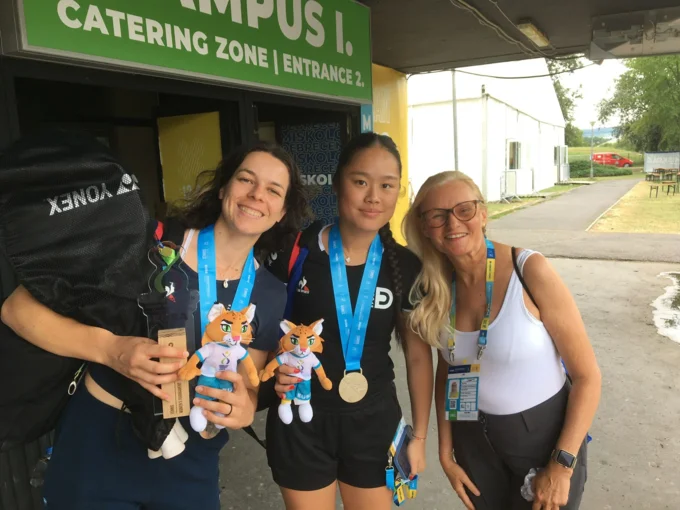
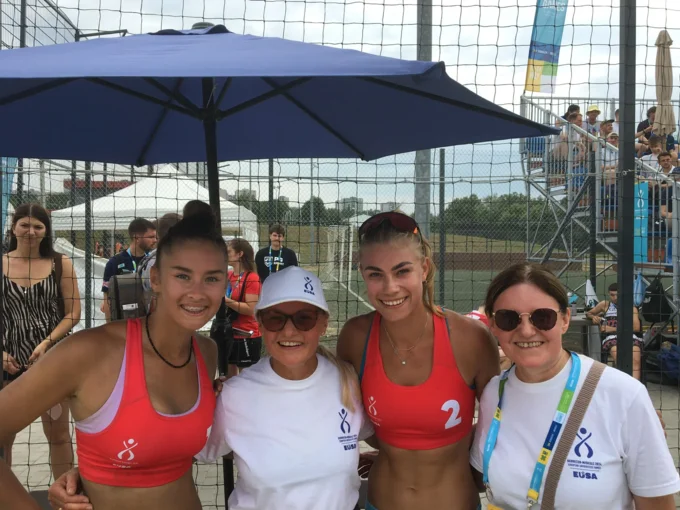
5. Can you share an anecdote or a memorable moment of your volunteering experience with EUSA?
When I answer this question, I immediately see the beautiful, centuries-old building of the Rectorate of the University of Granada. It's where the opening ceremony of the EUSA Tennis Championships will take place. The teams representing each university enter the hall and are directed by volunteers who walk in front of them, left to Emma, the International Volunteer, or right to me, to take their places in the designated sectors. Emma knows her guests, and I know mine, and we are both ready to point them to a seat in the appropriate row. And although everything was perfectly prepared, emotions get the better of me and a friendly team from Split, for whom Emma has a seat, passes to my side. To avoid repeating this mistake and to keep the ceremony running smoothly, I quickly came up with a simple system of signaling with my hands above my head, smiling and indicating to the volunteers whether they should go towards me or towards Emma. Surprisingly, this was appreciated by the EUSA authorities, who invited us both to a welcome banquet to get to know each other. That gave us the unique opportunity to meet and speak with the EUSA authorities.
6. What is the most exciting thing related to the European Universities Games 2024?
I can only come up with one answer - the power of cheering that I witnessed myself. That's when you feel an emotional connection with the player or the team. It makes you feel needed, fulfilled, part of the success. Your emotions are a source of energy that you share with others. Your energy gives the players the strength to overcome their own weaknesses, to continue to play the game, not to give up, and to win. Outside spectators are usually not present at EUSA games. The players only have the members of the team and us volunteers. You can't even imagine the support you can give them with your presence, smiles, being together in the joy of success and the sadness of defeat. You feel that you are one of them, part of their team. I had this feeling last year in Granada when I cheered for Zosia, a tennis player from Poznan Medical University, and this year in Miskolc during the beach volleyball competition for the boys from Dublin University in Ireland, which is my country now.
What I find especially interesting is that my personal findings are confirmed by scientific research conducted by Miskolc's Institute of Sport Science. The study showed that cheers can increase the performance of athletes by up to 7%. This is an incredible fact. These studies show that volunteers play a very important role in helping athletes compete and achieve the goals for which they came here. It is also a determinant of their participation in future editions of the event. And that, in turn, affects how well the organizers succeed.
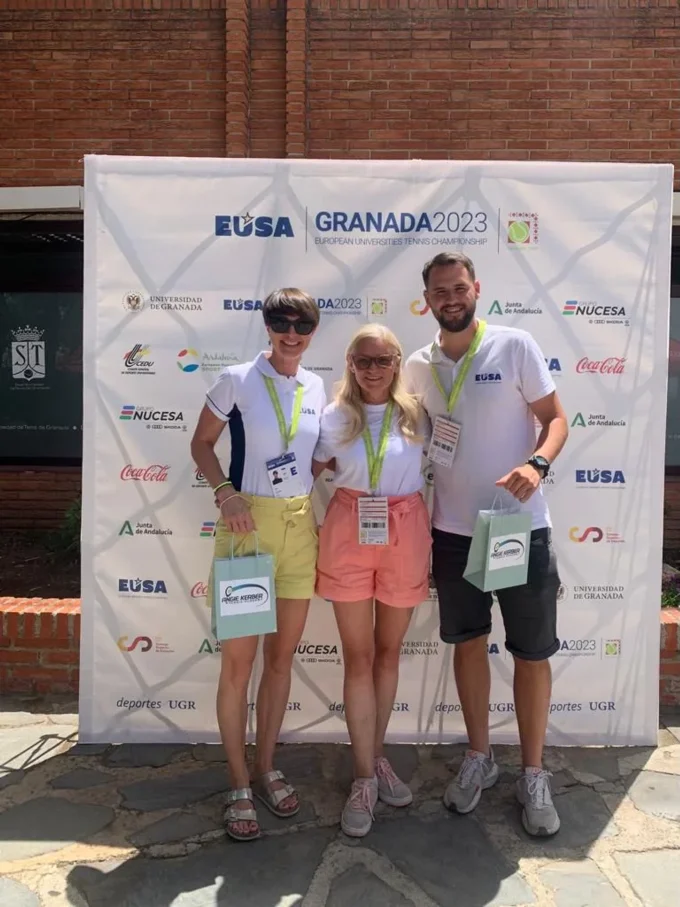
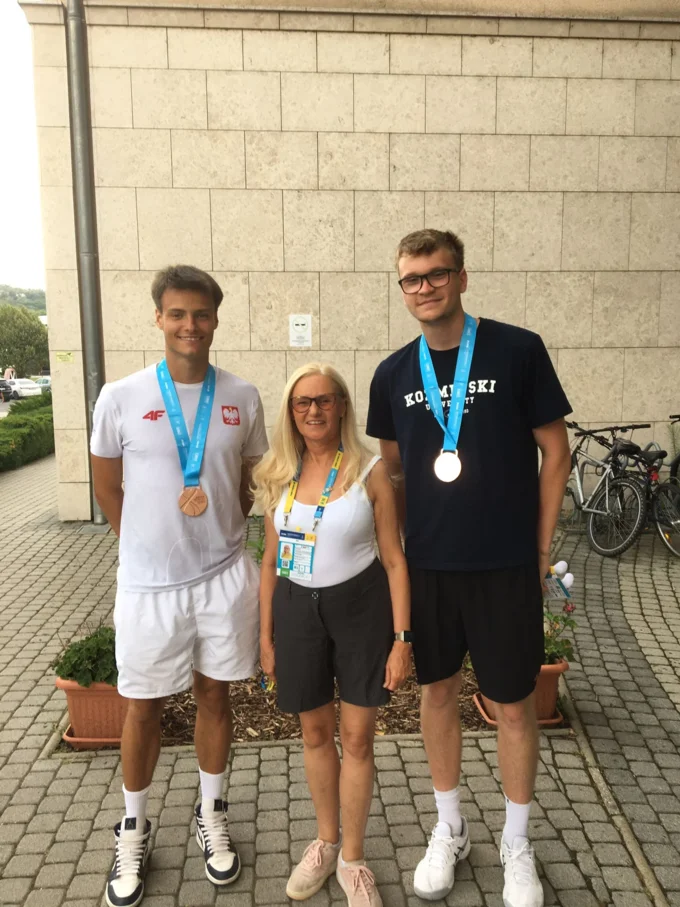
7. What would your message be to people who are hesitating to register as volunteers?
I would like to focus on two aspects of this question. First, the concerns associated with being a volunteer, such as duties, rights, responsibilities and benefits. Second, the process of signing up as a volunteer itself, such as the time it takes, preparing a portfolio, being interviewed, being recruited and the joy of acceptance or the sorrow of rejection. Is volunteering suitable for everyone? Certainly for those who value the welfare of others above their own income, who prefer giving instead of taking, sharing instead of just receiving. But you won't know if it's for you until you try it. And even if you do make a commitment, you can walk away at any time, and if you don't like the work, you can ask for a change. You are free. But volunteering is also about taking responsibility for the task, because you are not working for yourself, but for others. Have I encouraged you to try it out? Great! There is still some recruiting to be done before your first assignment but treat it like an adventure. Angelique Kerber, one of the best tennis players in the world, once said that if you do something with passion, you are guaranteed to succeed at it. I hope this proves to be true for you and I'm looking forward to volunteering with you at the next EUSA Championships and Games!
